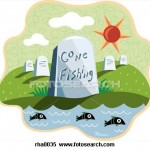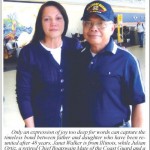Sermon:Â 13th Sunday after Pentecost.
Reading: Matthew 15:21-28
 What would you think if I told you that on your headstone would be inscribed a four word epitaph? Well, you might respond, it would depend on who wrote this epitaph – an enemy or a loved one. It might also depend, you could say, on how well this person knew and understood you. Do they really know what they are talking about?
What would you think if I told you that on your headstone would be inscribed a four word epitaph? Well, you might respond, it would depend on who wrote this epitaph – an enemy or a loved one. It might also depend, you could say, on how well this person knew and understood you. Do they really know what they are talking about?
If, for instance, a newspaper critic wrote of a concert pianist the four words: “He was a failure,” you could always say: “That was just his opinion.†But if one of the world’s great musicians wrote, “He was a genius,†then you could have some confidence that this person knows what they were talking about, and you would take the remark more seriously.
There was a character in the Gospel whom Jesus once described with four immortal words: “Great is your faith.†She was a Canaanite woman who came from the country to the north of Palestine, a country hostile to the Jews. She was presumably married – she had at least one child – but that’s all we know about her.
We don’t know whether she was a good woman or a bad woman. We don’t know her name. All we know of her is that in this single encounter with Jesus he spoke to her these striking four words: “Great is your faith.â€
Only four words, but four remarkable words. We can trust these words as true, because the expert on faith spoke them. Jesus searched for faith in people, as a gem collector searches for fine jewels. He didn’t find much. The Jewish religious people of the Temple had faith in themselves and their own goodness mostly, but that was about it.
He did not often even find faith in his disciples. On no occasion that we know of did he ever say of Peter, James and John: “Great is your faith.†More often the words he spoke to them were: “You of little faith.†On only one other occasion did Jesus praise a person for their faith. Interestingly, it wasn’t an Israelite or one of the twelve, but again (like this Canaanite woman) a foreigner in Jesus’ world, somebody from outside – Roman soldier stationed in Capernaum, who turned to Jesus for help.
“Great is your faith,†said Jesus of this woman. We need to pay attention to her, because surely if her faith was great we can learn something from her. She awakens in us a feeling of admiration, perhaps even envy, because she stands where most of us would like to stand.
Most of us would love to have her great faith – it would help us enormously in the problems of life. We could deal with our stresses and fears and trials with so much more peace and calmness. We could live life with confidence because we had faith in God’s provision and help. We could let go of our anxieties and step into each new day with a joyful kind of freedom because our trust was in God alone. Great Faith, or even just a bit more faith would be so helpful.
So what is her secret? What was the secret of her great faith? What was it she had that made Jesus say this about her?
The answer is … nothing. Nothing!
She had nothing and, in that place, a Canaanite woman coming before a Jewish Rabbi, culturally and religiously speaking she was nothing. She was a woman. She was unclean. She was not a Jew. She was, even to the disciples, a nobody, a noisy and irritating pest. She had no right to ask anything of Jesus. She had no basis for having her cry for help heard.
But, in the face of all that, the text tells us she came and knelt down at Jesus’ feet and said, “Lord help me.â€
One of the famous drawings of this scene from the renaissance pictures shows the woman kneeling down before Jesus, with her desperate empty appealing hands lifted up into his face – Lord, help me.
That is what she had – empty hands – uplifted to Jesus in desperate empty, searching, crying, needy faith. Great faith.
She understood her situation perfectly. She knew she was a foreigner, a goy, a heathen and a nobody in the eyes of this group of Jewish religious males.
And amazingly, perhaps unexpectedly, Jesus draws even more attention to that. In fact, he does more than that – his words to this woman here in verse 26 seem really quite brutal. Jesus says to her: Now come on, I am the Messiah sent to Israel – you can’t expect that I am going to help you. And then he uses that image so well known as the Jewish put-down for heathen foreigner – the dog, an unclean animal. He says: What I have is meant for the children of Israel – I can’t take that and throw it to a dog like you.
Yes, I know, she says. I am a dog – but maybe even a dog like me can eat the crumbs that fall from your table.
She lowers herself, she kneels down in the dust, she demeans herself completely. Yes Jesus, she says, I am nothing but you have everything. Lord, help me.
That’s why Jesus says to her those words he never is able to say to those twelve disciples standing there with him that day: Woman, great is your faith. Let it be done for you as you wish.
What was the secret of her great faith? Her deep awareness of her own utter emptiness. She knew she was not even worthy of Jesus’ attention, that she had no claim, nothing to bring or offer as the basis for her appeal. She knew she was “a dogâ€. And it was from this lowest of places that those empty hands were lifted up.
That’s great faith. It is not a matter of being a hero or some kind of super-believer. It is learning that you are in fact a beggar. It is a matter of being aware that you have nothing to bring before God and nothing to say to God, except maybe: “Lord, help me!â€
That is our position and our situation before God too. We are in just the same place as this woman. We are sinners, foreigners, specks of nothing before God. He owes us nothing. I’m sorry if that offends you. I know it is not a very popular thing to say that today. But it is true. If we fool ourselves for one minute that we have something over God, some claim on His favour, then we are lost – our faith is then in ourselves and not in God at all.
Luther’s famous last words on this earth were “We are beggars. That is the truth.â€
Beggars – God’s beggars – kneeling before a loving and mighty Lord with our empty hands open, ready to be filled with the bread of heaven. Beggars made rich; beggars loved and dressed in fine clothes; beggars adopted and brought in from the cold; baptised into the royal family; beggars lifted up by the forgiveness and grace of Jesus Christ.
If we learn this lesson of how to be God’s beggars and we learn how to kneel before him and say “Lord, help me,†then great is our faith too.
Amen.








